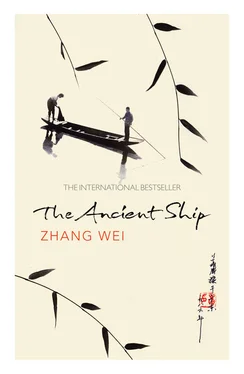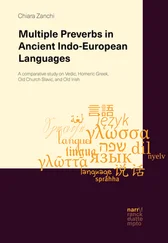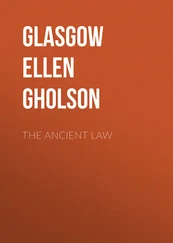In the people’s memory, the Sui clan’s fortunes were tied to their noodle business, which had begun as a tiny enterprise. The height of prosperity was reached in Sui Hengde’s day—he had built a factory that occupied land on both sides of the river; by then he was also operating noodle shops and money-lending ventures in several large cities in the south and northeast. He had two sons, Sui Yingzhi and Sui Buzhao. As children the brothers studied at home with a tutor, but when they grew older, Yingzhi was sent to Qingdao for a Western education, while Buzhao spent much of his time strolling aimlessly down by the pier until his brother returned. Buzhao was often heard to say that one day he’d board a ship and head out to sea. At first Yingzhi did not believe him, but his fears mounted, until one day he reported his concern to his father, who punished his younger son by smacking his hand with a ruler. As he rubbed his hand, Buzhao glared at his father, who saw in that look that nothing he did was going to change the boy’s mind. “That’s that,” he said, and abandoned the ruler. Then, late one night, strong winds and the rumble of thunder startled Yingzhi out of a deep sleep. He climbed out of bed to look outside and discovered that his brother was gone.
Sui Yingzhi suffered from remorse over the disappearance of his young brother for most of his life. When his father died, he took the reins of the vast family holdings. His own family included two sons and a daughter. Like his father, he made sure that his children received an education and, from time to time, employed the ruler to ensure discipline. This period, spanning the 1930s and 1940s, witnessed the beginning of the Sui family’s decline. Sui Yingzhi’s life would end in a sad fashion, and in the days before his death he would find himself envying his brother, but too late…
Buzhao sailed the seas for most of his adult life, not returning home until a few years before his brother’s death. He hardly recognized the town, and it certainly did not recognize him. He swayed as he walked down the streets of Wali as if they were an extension of his ship’s decks. When he drank, the liquor dribbled through his beard down to his pants. How could someone like that be an heir to the Sui fortune? Morbidly thin, when he walked his calves rubbed against each other; his face had an unhealthy pallor and his eyes were dull gray. What came out of his mouth was unadulterated nonsense and unbridled boasts. He’d traveled the world over the decades he’d been gone, from the South Seas to the Pacific Ocean, under the guidance, he said, of the great Ming dynasty sea captain Zheng He. “Uncle Zheng was a good man!” he proclaimed with a sigh. But, of course, no one believed a word of it. He spun yarns about life and death on the open sea, often drawing a crowd of curious youngsters. Men sail by following an ancient navigational handbook, Classic of the Waterway, he told his audience, who listened raptly, hardly blinking, and he roared with laughter as he regaled them with descriptions of the fine women on the southern seacoasts…The man is destined for a bad end, the townspeople concluded. And the Sui clan will die out.
The year Sui Buzhao returned home ought to have been entered into the town’s chronicles. For that spring a bolt of lightning struck the old temple late one night, and as people ran to save it, flames lit up all of Wali. Something inside exploded like a bomb, and the old folks informed the crowd that it must have been the platform holding the monk’s sutras. The old cypress edifice seemed to be alive, its juices flowing like blood; it shrieked as it burned. Crows flew into the sky with the smoke as the frame supporting the great bell crashed to the floor. The fire roared, almost but not quite drowning out soft moans, high one moment and low the next, like the lingering echoes of the great bell or the distant strains of an ox horn. What petrified the people was how the flames rose and fell in concert with the sound.
The fire reached out at people nearest the burning building like red fingers, knocking down those who tried to put out the inferno. With moans, they stood up but made no more attempts to move ahead. Old and young, the townspeople stood around like drooling simpletons. None had ever witnessed such a blaze, and by first light they saw that the temple had burned to the ground. Then the rains came, attacking the ash and sending streams of thick, inky water slowly down the street. Townspeople stood around in silence; even chickens, dogs, and waterfowl lost their voices. When the sun went down that night, the people climbed onto their heated brick beds, their kangs, to sleep, and even then they did not speak, merely exchanging knowing glances. Then days later, a sailing ship from some distant place ran aground in the Luqing River, drawing the curious down to the riverbank, where they saw a three-master stuck in midriver. Obviously the waters had receded and the river had narrowed; ripples ran up onto the banks, as if the river were waving good-bye. The people helped pull the ship free of the sandbar.
Then a second ship came, and a third, and they too ran aground. What the people had feared was now happening: The river had narrowed to the point where ships could no longer sail it, and they could only watch as the water slowly retreated and stranded their pier on dry ground.
A torpor held the town in its grip, and as Sui Buzhao walked the streets, deep sorrow emanated from his gray eyes. His brother, Yingzhi, whose hair had turned gray, was often heard to sigh. The glass noodle business relied on a source of water, and as the river slowly dried up, he had no choice but to shut down several of the mills. But what bothered him most was how the world was changing; something gnawed at his heart night and day. As for his brother, who had returned home after so many years at sea, Yingzhi’s sadness and disappointment deepened. On one occasion, women carrying noodles out to the drying ground threw their baskets down and ran back, agitated, refusing to put the threads out to dry. Puzzled by this strange occurrence, Yingzhi went out to see for himself. There he saw Buzhao on his back, lying comfortably on the sandy ground, naked as the day he was born, soaking up sun.
Sui Yingzhi’s eldest son, Sui Baopu, had grown into a delightful, innocent boy who loved to run about. People said, “The Sui clan has produced another worthy descendant.” Sui Buzhao doted on his nephew, whom he often carried around on his shoulders. Their favorite destination was the pier, now long out of use, where they would look out at the narrowed river as he entertained the boy with stories about life on the open sea. As Baopu grew tall and increasingly good-looking, Buzhao had to stop carrying him on his shoulders. So now it was the turn of Jiansu, Baopu’s younger brother. Baopu, meanwhile, a good child to begin with, was getting increasingly sensible, so his father wrote out some words for him to live by: Do not be arbitrary doctrinaire, vulgar, or egocentric. Baopu accepted them exactly as they were intended.
The first three seasons of the year—spring, summer, and fall—passed without incident, and when winter came snow buried the icecovered river and the old mills on its banks. As the snow continued to fall, people ran to the Li compound to observe the meditating monk; the sight of the shaved-pated old monk reminded them of the splendid temple that had once stood in town and of the ships that had come there. Their ears rang with the sound of sailors hailing each other. When he completed his meditation, the monk told tales of antiquity, which were as incomprehensible to the people as archaic prophesies:
The Qi and the Wei dynasties contended for superiority over the central plains. When the residents of Wali came to the aid of Sun Bin, King Wei of Qi rose above everyone, to the amazement of all. In the twenty-eighth year of the Qing dynasty, the First Emperor traveled to the Zou Mountains south of Lu, from there to Mt. Tai, and then stopped at Wali to make repairs on his ships before visiting the three mystical mountains at Penglai, Fangzhang, and Yingzhou. Confucius spread his system of rites everywhere but eastern Qi, where the barbarians had their own rituals. The sage, knowing there were rituals of which he was ignorant, sent Yan Hui and Ran You to learn and bring some back from the eastern tribes. The two disciples fished in the Luqing River, using hooks and not nets, as taught by the sage. A resident of Wali who had studied at the feet of Mozi for ten years could shoot an arrow ten li, making a whistling sound the whole way. He polished a mirror in which, by sitting in front of it, he could see everything in nine prefectures. Wali also produced many renowned monks and Taoists: Li An, whose style name was Yongmiao and whose literary name was Changsheng, and Liu Chuxuan, whose style name was Changzheng and whose literary name was Guangning, were both from Wali. A plague of locusts struck during the reign of the Ming Wanli Emperor, darkening the sky and blotting out the sun like black clouds, creating a famine. People ate grass, they ate the bark of trees, and they ate each other. After sitting in deep meditation for thirty-eight days, a monk was awakened from his trance by acolytes striking a brass bell and immediately rushed to the entrance of the town, where he tented his hands and uttered a single word: sin! All the locusts in the sky flew up his sleeve and were dumped into the river. When the Taiping rebellion broke out, villagers near and far fled to Wali, where the town gate was flung open to welcome any and all refugees… The monk’s stories excited his audience, though the people understood hardly a word of what he said. And as time passed, they grew to accept the anguish of unbearable loneliness and suffering. Now that the waters had receded and the pier was left on dry land, the ship whistles they’d grown used to were no longer heard. That gave birth in their hearts to an inexplicable sense of grievance, which gradually evolved into rage. The monk’s droned narration of olden days awakened them to the reality that the temple had burned to the ground, but that its bell remained. Meanwhile, time and the elements had peeled away layers of the imposing city wall, although one section remained in good repair, maintaining its grandeur. The absence of boisterous, agitating outsiders, people realized, actually improved the quality of life in town; the boys were better behaved, the girls more chaste.
Читать дальше












